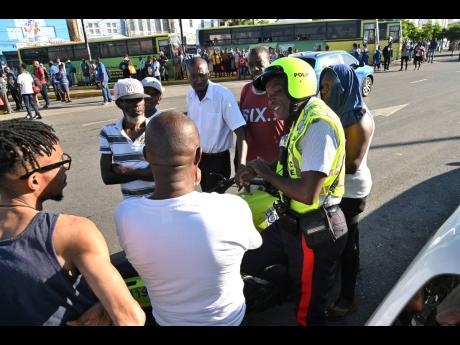Editorial | Not too late to fix traffic amnesty
This newspaper often makes the point that what is worse than bad policy is the implementation thereof. But even good policies can be problematic if they are badly implemented.
The government’s latest traffic ticket amnesty, which Parliament formally approved last week, and which ends tomorrow, falls somewhere between these two extremes, although it tends more towards the latter. Which is why, even at this stage, the administration should rethink its position, rather than continue to allow hubris, and the need to save face, impede good judgement.
On February 1, Jamaica’s new Road Traffic Act is to come into force, providing higher fines for traffic offences, including those for which motorists receive tickets. Overall, the government believes the new law, as well as their ability to have real-time, online access to a digital database, will improve the efficiency with which traffic cops do their jobs and cause greater adherence to traffic regulations.
Public transport operators, especially bus and taxi drivers – who have a reputation for violating the road code, as well as for possessing loads of outstanding traffic tickets – were the focus of attention as the new legislation was being developed, although they claim to be often unfairly set upon by the police.
Its against the perception of the authorities’ attitude towards them that buses and taxis struck for two days in November, calling for a full amnesty on their traffic tickets, or substantial time to pay outstanding amounts. The government, on the face of it, rejected the demand.
However, weeks later, in mid-December, the Government announced that all outstanding traffic tickets, inclusive of demerit points, issued prior to February 1, 2018, would be expunged, thus becoming null and void.
The demerit points on tickets, issued after February 1, 2018, would be expunged if the fines on those tickets were paid by January 31, which is tomorrow.
But in a contorted attempt to claim that it had not granted a ticket amnesty or had acquiesced to the transport operators, the government required that the outstanding ticket-holders have to appear before parish judges to be fined and afforded leniency on the demerit points. Last week, legislation caught up with the policy.
INEVITABLE HAPPENED
The inevitable also happened. As this newspaper warned at the start of January, and as common sense foretold, the parish courts, especially in Kingston and St Andrew, have been overwhelmed by the huge crowds that have turned up to pay their fines. Extended court hours made little difference.
Many thousands of people who want to pay their fines have been unable to do so, and won’t be. Yet, improbably, the transport minister, Audley Shaw, was in Parliament on Thursday imploring those who still had outstanding tickets “to appear early before the Traffic Court, and if they are having challenges paying their traffic tickets, to indicate their difficulty to the courts, to see whether any appropriate arrangement can be made concerning the payments”.
Mr Shaw, like others of his colleagues, clearly missed the point. For most people, the issue is not about a payment plan, but ensuring, as the minister also noted, that the results of their past mistakes are not “carried forward”.
In previous traffic amnesties, in 2012 and 2017, outstanding fines were paid at tax offices or other places that collect payments on behalf of the government, and even then venues were crowded. The same system ought to have been, and should still be, used for this one.
The government did not have to offer this amnesty. It did so, it said, on two bases: to start the new law with a clean slate, and because of credible complaints that the old database held many inaccuracies. Many paid tickets were not recorded on the database.
Having gone this route, which it was not forced to, the government should make it work, rather than be undermined by face-saving hubris.
It is a signal, and good governance, when governments admit to, and overturn, bad policies, or seek to implement good ones better.

